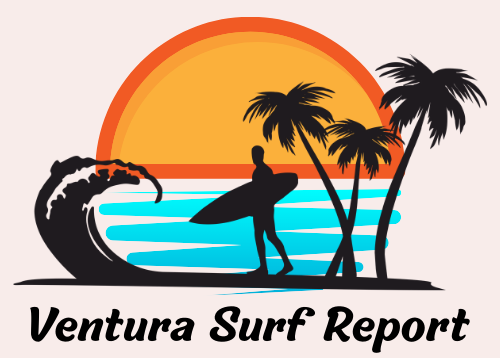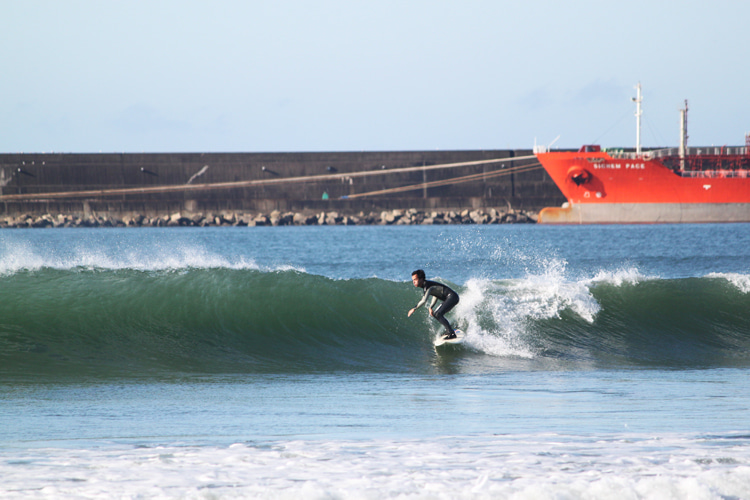
Imagine one of Europe’s busiest surf breaks being closed for surfing throughout the summer. What could’ve been just a supposition is actually true and real.
Imagine that you’re sold a highly consistent beginner and intermediate wave that runs for around 300 days a year, in an exciting urban context that has been named Europe’s best city break destination for several years.
Imagine you can get on the metro and ride downtown to the beach in half an hour. And then, when you’re done, you’re surrounded by restaurants where you’re told you can eat the world’s best fish.
Now that you’ve booked your flights and hotel and arrived at this idyllic destination somewhere in Southern Europe, you grab your own (or rented) surfboard and head to the surf spot in question.
As you arrive at the sand strip, you do see some swell coming, but you also witness the lifeguard’s red flag raised and waving to the offshore wind.
“Red flag with waist-high waves? What’s the danger that I am not seeing? Are there any super strong rip currents that I’m not aware of?” you wonder.
Sadly, that’s not the case.
In the times of universal enchantment with artificial intelligence (AI), there are still a few problems the world has to deal with, and this new beautiful world hasn’t been able to solve them.
But only a few (ironic tone, here). Everything else, leave it to AI and the geniuses behind it.

“Sorry: The Beach Is Closed for Summer”
While some nations have wisely adopted strict policies and built solutions to address water pollution, others are going backward to primitive times.
And this is also a cultural thing, but I am not even going into that.
The thing is, how can you sell in fancy print and video ads one of Europe’s most consistent waves and the world’s best fish if you can’t have that same stretch of coastline clean, unpolluted, and open to beachgoers, surfers, and swimmers, not even during summer?
How in the world can a decision-maker think that by extending the nearby port’s breakwater by 985 feet (300 meters) to accommodate larger cargo and cruiser ships, pollution levels in the adjacent beaches won’t get worse?
Let alone changes in the surf break’s bathymetry through the changes and decrease in swell activity.
And then, if that’s not enough of a poor integrated management and vision for a region and tourism, add the inability to control the origin of illegal fluid discharges that flow through local streams toward the beach.
Ports are fundamental structures, especially in the outer regions of Europe. They play a critical role in connecting central and distant economies.
But, at some point, if you’re a local or national government decision maker, you will have to make choices.
If your focus is on tourism, and surfing is a nice complement (the next golf, some say), maybe you should take care of the urban sand strip as if it’s gold, all year round.
If you’re inviting people to come and surf and then they’re not allowed to get their feet on the water due to high E. coli, I can bet they won’t also try the grilled fish restaurants prepared in the vicinity.

Polluting Industries or Tourism: You Can’t Have Both
People’s consciousness is changing.
We are all more aware and more demanding, and spending money on summer holidays that you can’t fully enjoy is no longer acceptable.
We’ve been through that, thank you.
Surfers have gone through the consequences of trying their luck in dirty waters. They got infections, they got sick, and they developed long-term illnesses by surfing in infected lineups.
That famous image of a surfer getting barreled inside a wave of trash and plastics in Bali is no longer tolerated, even more so by younger generations.
Now, imagine that in the Western developed and developing countries.
The times when oil wells punctuated the California shoreline are long gone, but sometimes it seems like we still tend to ignore these outdated paradigms.
If we think, as a society, that we can fool and trick people into believing we can have the best of both worlds – polluting industries and untreated sewage in a surf town with perfect waves – it’s only a matter of time before that mindset collapses.
So, if you’re extending a breakwater next to a popular surfing beach, you’re telling the locals and the visitors which economic paradigm you’ve chosen.
You’re choosing stagnant waters that receive little oxygen and too much contaminated water over an economy driven to benefit the people that live and work in the region.

Back to the Beach Oil Wells Paradigm
The example described above is real. The place is real.
Consequently, the surf break in question is witnessing a seasonal shift of the surf schools toward other neighboring beaches.
With a red flag and filthy ocean waters, there’s no way a young Central European surf tourist will take the risk and paddle out.
It starts with surf schools moving away and propagates to restaurants, accommodation, real estate devaluation, etc.
It’s Southern Europe, but similar occurrences take place in California.
And while we still wait for AI to address and tackle these and other issues Humanity faces right now, we watch our oceans becoming the landfill of Planet Earth.
If there’s something that makes me lose hope in our collective drive to do the right thing, this is one of them.
Words by Luís MP | Founder of SurferToday.com


Leave a Reply